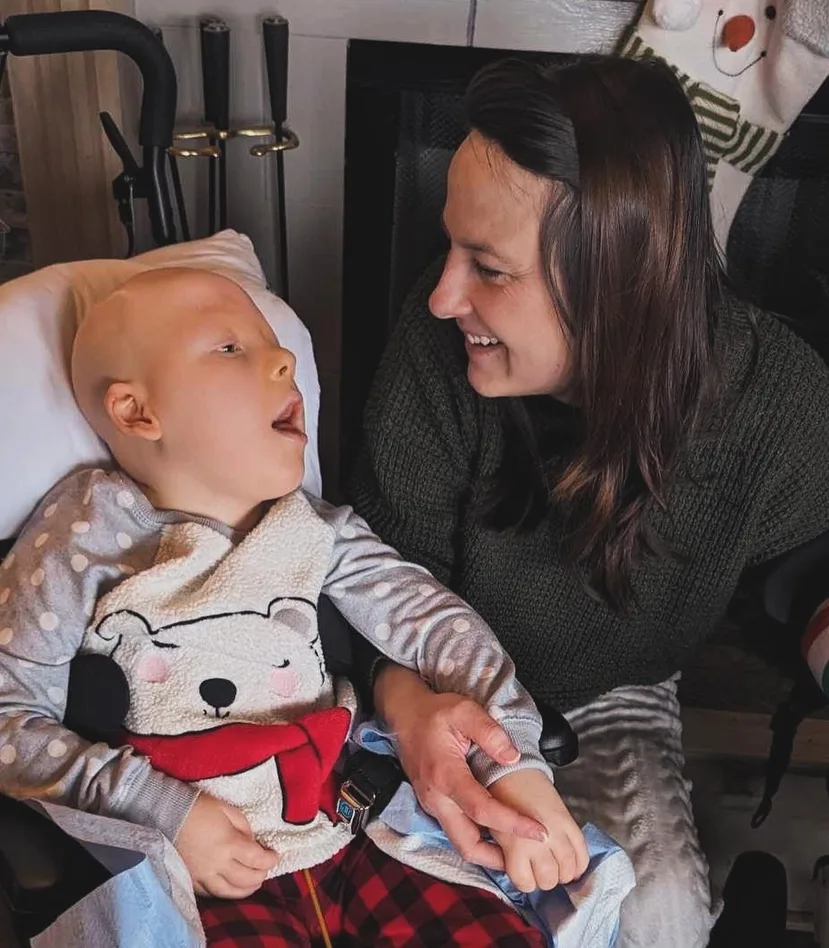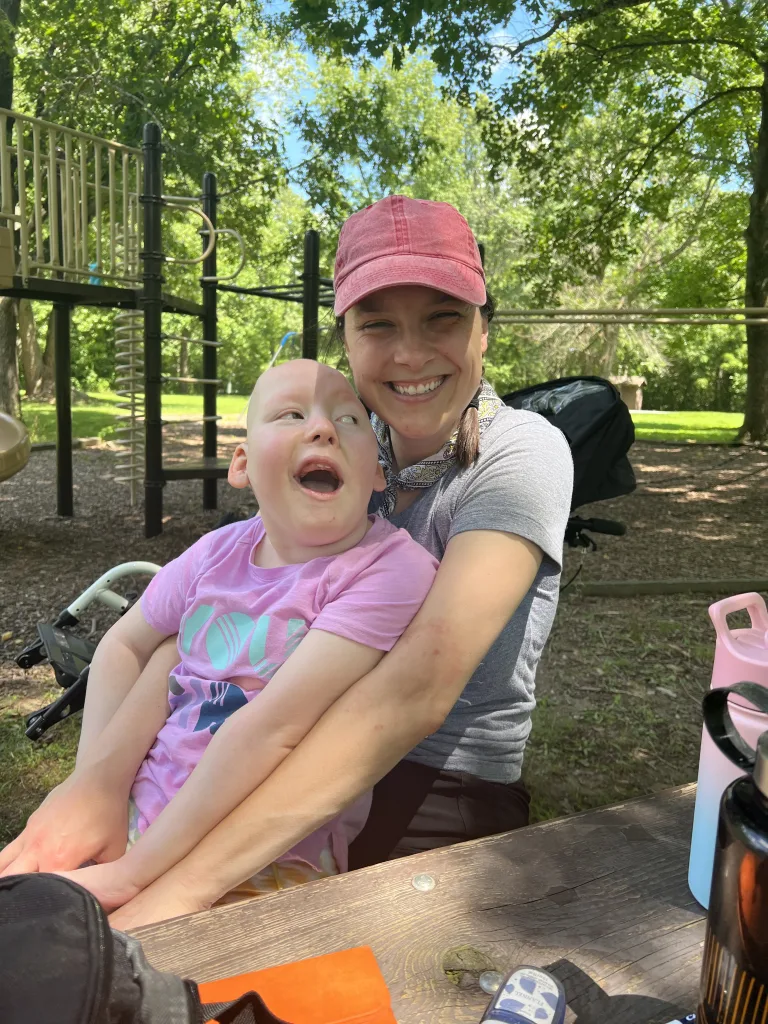DSCC Earns Case Management Accreditation
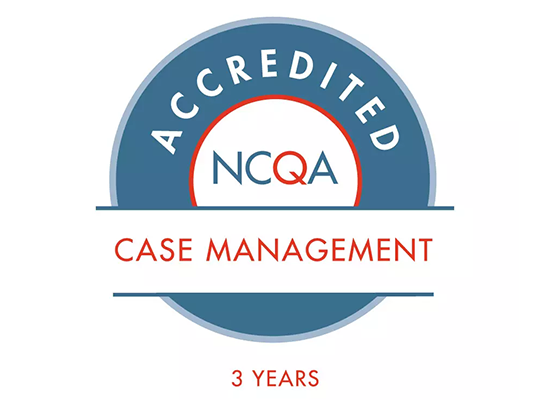
The prestigious achievement recognizes our commitment to providing the highest quality service and support to our participant families.
We are proud to share a significant milestone for our University of Illinois Chicago’s Division of Specialized Care for Children (DSCC) team.
DSCC has earned Case Management Accreditation from the National Committee for Quality Assurance (NCQA). This achievement recognizes our commitment to providing exceptional care coordination and related support to our participant families.
NCQA accreditation is widely known as a symbol of quality and shows an organization’s dedication to meeting high performance measures and continuous improvement.
“We are thrilled to receive NCQA Case Management Accreditation, which highlights the strength and person-centered focus of our care coordination services,” said DSCC Executive Director Thomas F. Jerkovitz.
“This achievement reflects the great work of our entire DSCC team to improve operations and strengthen how we partner, help and connect with families throughout the state. We hope our participant families can feel confident and empowered, knowing they have a strong support system focused on improving their quality of life.”
DSCC provides care coordination to Illinois children and youth with special healthcare needs and their families through several programs.
We tailor our care coordination to each family’s unique needs and goals. We partner with them to develop a care plan focused on a child’s medial, social, behavioral, educational and financial needs.
Our care coordination can include finding specialized medical care, helping families understand their child’s diagnosis and medical treatment plan, explaining insurance benefits and attending school meetings.
In 2021, DSCC’s leadership set a strategic goal to work toward NCQA accreditation. Our team members have worked for more than three years to achieve this major recognition.
NCQA purposely sets its accreditation standards high to encourage organizations to continuously enhance their quality. The standards aim to help organizations achieve the highest level of performance possible and create an environment of continuous improvement.
The NCQA Case Management Accreditation Program reviewed our care coordination and entire organization against the following standards:
- Program Description: The organization uses up-to-date evidence-based information to develop its case management program and regularly updates the program with relevant findings and information.
- Patient Identification and Assessment: The organization systematically identifies patients who qualify for its programs.
- Care Planning: The organization coordinates services for patients through the development of individualized care plans.
- Care Monitoring: The organization has systems in place to support case management activities and monitors individualized care plans.
- Care Transitions: The organization has a process to manage care transitions, identify problems that could cause care transitions and prevent unplanned transitions, when possible.
- Measurement and Quality Improvement: At least annually, the organization measures patient satisfaction, program effectiveness and participation rates.
- Staffing, Training and Verification: The organization defines staffing needs, provides staff with ongoing training and oversight and verifies healthcare staff credentials.
- Rights and Responsibilities: The organization communicates its commitment to the rights of patients and its expectations of patients’ responsibilities.
“Case Management Accreditation moves us closer to measuring quality across population health management initiatives,” said NCQA President Margaret E. O’Kane. “Not only does it add value to existing quality improvement efforts; it also demonstrates an organization’s commitment to the highest degree of improving the quality of their patients’ care.”
A big congratulations and thank you to everyone who helped us reach this milestone!
NCQA is a private, nonprofit organization dedicated to improving health care quality. NCQA accredits and certifies a wide range of health care organizations. It also recognizes clinicians and practices in key areas of performance. NCQA’s Healthcare Effectiveness Data and Information Set (HEDIS®) is the most widely used performance measurement tool in health care. NCQA’s website (ncqa.org) contains information to help consumers, employers and others make more-informed health care choices. NCQA can be found online at ncqa.org, on Twitter @ncqa, on Facebook at facebook.com/NCQA.org/ and on LinkedIn at linkedin.com/company/ncqa.
Important DSCC Contact Information Updates

Participant families, please save our (800) 322-3722 number to your contact list!
As part of our commitment to serving our participant families, we want to ensure you can easily reach us whenever you need help or have questions.
Please take a moment to save our toll-free (800) number to your contacts list: (800) 322-3722.
This step will help prevent our calls from being mistaken as spam. It will also help ensure you receive important updates and support from your care coordination team.
Our (800) 322-3722 number remains the simplest and fastest way to reach anyone at the Division of Specialized Care for Children (DSCC).
You can use this number to dial your Care Coordinator’s direct extension or have our Customer Service Representatives connect you with the right person or team.
Saving our number to your phone’s contact list can help improve the process in several ways:
- Have quicker access – Having our number readily available in your contacts can save time when you need assistance or have questions.
- Avoid spam filters – Saving our number reduces the likelihood our calls will be flagged as spam.
- Communicate more seamlessly – Having one number to call helps ensure smoother communication whenever you need support or would like to share feedback.
You may also reach us electronically through our general dscc@uic.edu email address or our Contact Us or Request a Callback forms on our website.
You can also use our new DSCC Family Portal to easily share information and communicate with your care coordination team. You can use the Family Portal to:
- Send messages
- Sign documents
- View important letters
- See a list of providers and much more
To access the portal, visit https://go.uic.edu/DSCCFamilyPortal.
To help you get started, we’ve created several tip sheets and videos for how to use the Family Portal. You can find these resources on our website at https://dscc.uic.edu/dscc-family-portal/.
If you have trouble accessing the Family Portal or need other support, please email dsccexternalhelp@uic.edu.
You can also speak with your Care Coordinator if you need to update your communication preferences.
Our office hours are 8 a.m. to 4:30 p.m. Please talk to your Care Coordinator if you need to speak outside of business hours.
We want to ensure our care coordination teams are easily accessible for everyone in our programs.
Thank you for your cooperation and partnership!
DSCC Creates New Tool to Improve Families’ Access to Available In-Home Nursing
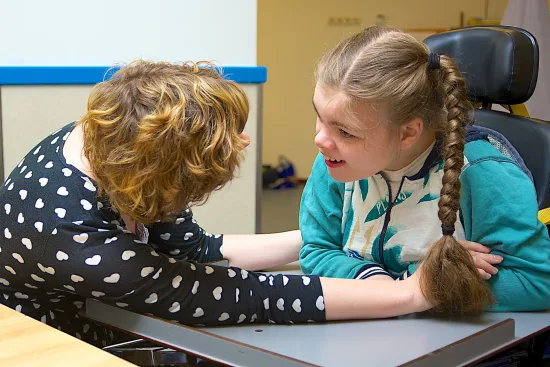
NurseNet helps Home Care Program families connect with nursing agencies to find available nurses in your area.
Finding in-home nurses can be challenging for many families caring for children and adults with complex medical needs.
We’ve created a new tool to help you find and connect with available nursing agencies in your area.
NurseNet aims to bridge the gap between Illinois families who need nursing and home health nursing agencies with available nurses.
Families of individuals enrolled in the Home Care Program can use NurseNet to share their nursing needs. Nursing agencies that are enrolled with the Division of Specialized Care for Children (DSCC) can share information about where nurses are available.
This information can help your family find suitable nursing care. It can also help nursing agencies identify opportunities to serve families.
Anyone can use NurseNet to search for general nursing opportunities across the state.
The search is set up for families and nursing agencies to find and share what they need easily. As a family enrolled in the Home Care Program, you can log in to NurseNet and enter your nursing needs.
Nursing agencies can see this information and contact your family within NurseNet if they have a potential nursing opportunity in your area that matches your child’s care needs. You can also use NurseNet to see where nursing opportunities are available throughout Illinois.
Nursing agencies enrolled with DSCC can log in to NurseNet and enter all areas of the state where they have nurses available. Nursing agencies can also see where families have nursing needs and connect with those families to provide nursing care.
Visit the NurseNet page on our website to learn about how NurseNet can help both families and nursing agencies. You can also find helpful videos and guides on how to use NurseNet.
We understand the search for in-home nursing can be frustrating and overwhelming. That’s why we created this tool to help you share your nursing needs and connect with nursing agencies with available nurses.
We are excited to offer this tool to help provide nursing connections to our participant families enrolled in the Home Care Program!
New Youth Advisory Council for Teens and Young Adults With Special Healthcare Needs
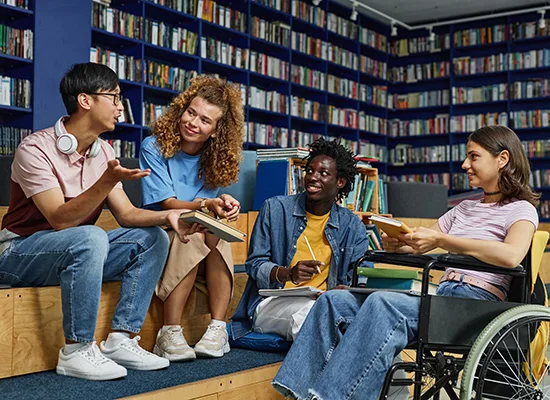
An opportunity for youth to help improve transition support and make a difference!
Youth with special healthcare needs should have a big role in shaping their future and helping improve support for others.
We want to hear from teens and young adults about what’s important and helpful to them as they plan for the future. Our new Youth Advisory Council is a great opportunity for them to share their input and make a difference.
The Youth Advisory Council (YAC) is a diverse, youth-driven group that aims to develop more youth-focused ways to help individuals and families with transition planning, resources and services.
The YAC’s goal is to support positive outcomes in adulthood for all Illinois youth with special healthcare needs in the areas of:
- Employment
- Health care
- Independence
- Quality of life
The YAC’s role is to:
- Bring a different and personal perspective on issues important to youth.
- Partner with the Division of Specialized Care for Children (DSCC) to help develop more youth-focused methods to enhance care coordination.
- Develop strategies to improve communication between youth/young adults and older adults.
Members participate in four virtual meetings per year.
Who is Eligible to Join the YAC?
The YAC is open to youth with special healthcare needs who are:
- Ages 15 to 24
- Living in Illinois
- Planning for the transition to adulthood in the areas of education, health care, employment and home and community-based support
Youth do not have to be a DSCC participant to join the council.
How to Join and Learn More
Members must complete an online application to join. (The application is also available in Spanish.)
Visit our Youth Advisory Council page for more information and answers to frequently asked questions.
You can also see the YAC flyer for more details:
If you have questions, please contact Claire Cook, DSCC’s Title V Program Transition Specialist, at clairer3@uic.edu or (800) 322-3722, ext. 21812.
Inclusive Summer Camp Programs for All Ages

Our list of camps and activities all over Illinois can help you find the right fit for your child
Summer and the long break from school are right around the corner!
The good news is there are a variety of programs throughout the state to help keep your children engaged and learning.
We’ve gathered a list of day and overnight camps as well as virtual programs for youth of all ages with disabilities and special healthcare needs.
Does your child want to make new friends? Develop new skills? Meet others with their same condition or become more independent?
Our 2024 summer camp list can help you find the right fit.
There are several ways to search the camp opportunities on our website:
- Use the search box and filter option on our Events page to search for camps and other related keywords and locations
- View our full 2024 summer camp list
- Use our Events Calendar view to see summer camps listed by date
These camps are accessible and inclusive for a variety of ages and needs, including many of our program’s eligible medical conditions.
Please note that program deadlines vary, and some camps fill up quickly.
Know of a good summer camp opportunity to add to our list?
Send us the details at dscc@uic.edu. We’ll continue to update our list of camps and activities, so please check back often!
Free Tax Help for Illinois Residents With Disabilities, Others in Need

Programs offering free tax preparation and help filing tax returns are available to eligible individuals and families across Illinois.
People with disabilities, families with low income, taxpayers who speak limited English, and individuals over the age of 50 can receive tax help through in-person and online programs.
Many of the programs will provide help through April 15, the deadline for filing your 2023 tax return. The type of services and programs available will vary by region.
The Internal Revenue Service’s (IRS) Volunteer Income Tax Assistance (VITA) and Tax Counseling for the Elderly (TCE) programs offer free basic tax return preparation to qualified individuals.
VITA sites offer free tax help to individuals, including:
- People who genrally make $64,000 or less
- People with disabilities
- Taxpayers who speak limited English
- People 60 years of age or older
The AARP Foundation Tax-Aide Service focuses on providing in-person and online tax help to people over the age of 50 or who have low-to-moderate income. You do not need to be an AARP member to receive assistance.
The AARP Tax-Aide Site Locator can help you find a site where an IRS-certified volunteer can help you prepare and file your taxes.
Tax-Aide also offers free virtual coaching and software for state and federal returns if you prefer to do your own taxes. You must:
- Have an income between $16,000 and $79,000
- Be an active-duty military member making $79,000 or less
In the Chicagoland area, taxpayers can also access the Ladder Up Tax Assistance Program (TAP). The program provides free basic tax return preparation for:
- Families earning up to $64,000 and individuals earning up to $32,000 per year
- Full-year Illinois residents
You can also contact your local library and government offices for information about free tax preparation services in your area.
DSCC’s New Home Care Family Outreach Associate is Available to Support Families
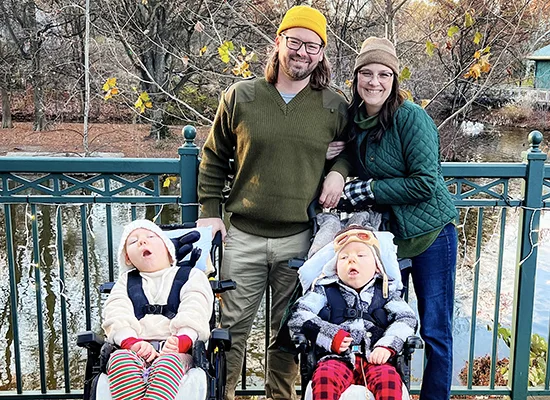
Our Home Care Family Outreach Associate Erica Stearns can offer support, connection and empowerment for DSCC families caring for loved ones with complex medical needs.
We understand that caring for a loved one with complex medical needs can pose unique and sometimes unexpected challenges for families.
We are excited to introduce a new Home Care Family Outreach Associate (HCFOA) on our team who understands these challenges and can provide heartfelt support.
With lived experience as a patient, parent and caregiver, our HCFOA can recognize shared experiences and guide families through the complexities of multiple systems of care.
Our HCFOA also works to create a sense of community for caregivers within the Division of Specialized Care for Children (DSCC). In this community, families can feel supported, empowered and more confident in their caregiving journey.
Erica Stearns recently joined DSCC as our first HCFOA. She is the proud parent of two children, Margot and Caratacus, who have been enrolled in the Core and Home Care programs since 2016. They reside in southern Illinois and enjoy the beauty of the Shawnee National Forest.
Erica also serves as the co-chair of DSCC’s Family Advisory Council. You can learn more about Erica, her family and her caregiving journey in The Stearns Family Story.
As our HCFOA, Erica works hand-in-hand with families and caregivers to:
- Create trusting partnerships
- Offer tailored support in addition to the care coordination services they receive from DSCC
- Provide essential caregiver resources
Erica helps ensure that caregivers are equipped with the knowledge and skills they need to advocate for their children and navigate complex systems of care. She can help support your family as you navigate:
- Adjusting to a new norm
- Needing support for your child/loved one’s medical needs and increased level of care
- Looking for guidance on what to expect
- Wanting to connect with other families
Families can request to connect with Erica in several ways. You can ask your DSCC care coordination team to refer you to the HCFOA. You can also email a request to speak with Erica at DSCC-FamilySupport@uic.edu.
For more information about the HCFOA and Erica, please visit our Home Care Family Outreach page.
Research Study Seeks Families to Help Improve Home Health Care for Children
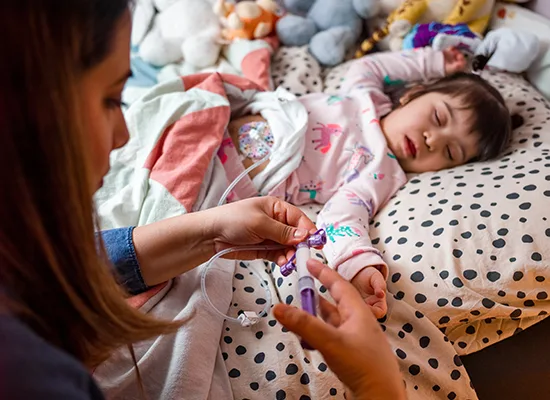
“SafeCare@Home4Kids” aims to understand and prevent safety issues at home for children with medical complexity
A research study is looking for families to help improve home health care for children with complex medical needs.
The study is called “The SafeCare@Home4Kids Learning Lab: Designing Safer Healthcare at Home for Children.” It wants to learn from parents of children with medical complexity about what it is like to care for your children at home, including giving your children complex medication and using your children’s devices. The study aims to find ways to help prevent safety problems with this complex caregiving at home.
Dr. Carolyn Foster of Ann and Robert H. Lurie Children’s Hospital of Chicago is leading the research team. Foster is also a member of the Division of Specialized Care for Children’s (DSCC) Medical Advisory Board.
By sharing your experiences, you can help “SafeCare@Home4Kids” find ways to better support and help parents while reducing problems and challenges at home.
What does the study involve?
Participation in the study will take about one week. For seven days, you will send photos or text-based messages about your experience with your child’s medication-related activities and devices at home. Please note, if you do not have a device, the study researchers will loan you one.
After the week is over, you will meet with research team members to talk about your messages. You will also participate in a “critical decision methods” interview about how you:
- Identify problems with your child’s medication or device
- Communicate the problem
- How you have problem-solved these issues in the past
The research team will keep your answers confidential. If you complete all study steps, you can receive up to $195 by virtual gift card.
How do I participate?
You can enroll in the “SafeCare@Home4Kids” study if you:
- Speak English or Spanish
- Have a child who is 17 years old or younger with a disabling complex chronic condition who uses an implanted medical device to receive medication at home (such as a gastrostomy tube)
Please email fosterlab@luriechildrens.org or call (312) 227-2510 to enroll or ask questions.
For more details about the “SafeCare@Home4Kids” study and DSCC’s involvement, please visit https://dscc.uic.edu/dscc-partners-in-research-study-to-improve-home-health-care-for-children/.
You can also see the study flyer for more information.
Important Update on Change Healthcare Cyberattack and Its Impact on Our Participant Families

We are working with our state and provider partners to try to ensure there is no impact on our participants’ care.
Late last week, we learned of a cyberattack affecting Change Healthcare.
We want to share how this event may impact our participant families. We also want to explain the steps that are in place to try to ensure there is no impact on your child’s care.
Change Healthcare/Optum is the database that the Illinois Department of Healthcare and Family Services (HFS) uses to manage pharmacy claims. Please see the following communication from HFS at https://hfs.illinois.gov/medicalproviders/notices/notice.prn240223b.html.
In addition to the impact on the pharmacy system, this cyberattack also affects some billing processes. Home nursing agencies use Change Healthcare’s system to electronically submit their bills for payment.
We have sent communication to the home nursing agencies who use electronic bills and put an alternative method of bill submission into place. This should not create any disruption in the nursing agencies’ ability to provide services in the home.
Lastly, our Division of Specialized Care for Children (DSCC) team is here to support your family with any issues you may experience.
If you have any concerns or need assistance, please reach out to your assigned DSCC Care Coordinator. We are happy to help you.
2024 Health Insurance Education Webinar Series for Families Kicks Off in March
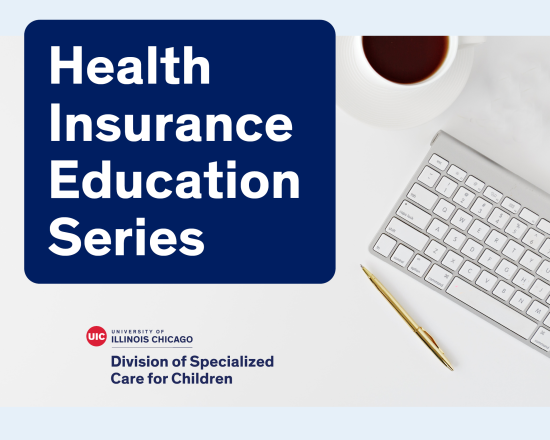
Free virtual training sessions for Division of Specialized Care for Children participants, their families and anyone interested in learning more about health insurance topics
Is figuring out your health insurance leaving you confused, frustrated or both?
Change your confusion to confidence with the University of Illinois Chicago’s Division of Specialized Care for Children (DSCC) Health Insurance Education Series.
These free trainings can help you better navigate your health insurance coverage and benefits. Each month, DSCC team members and other presenters will explain a different topic.
Each presentation will be in English. A Spanish interpretation line will be available during each session.
Check out the topics, mark your calendars and register for each session you’re interested in attending.
The session descriptions are in English followed by Spanish:
- Social Security Benefits, March 12 at 6 p.m.
- This training will help you understand Social Security benefits. Presenters from the Social Security Administration will share information about Supplemental Security Income and Social Security Disability Insurance. You will learn who can get benefits and how to apply for benefits. It will also cover what the Social Security program benefits are and how to keep your benefits.
- See the Social Security flyer for more details.
- Register on Zoom for Social Security Benefits
- Medicaid Denials, April 9 at 6 p.m.
- This training will help you understand Medicaid denials. It will review the common reasons that Medicaid denies services, such as equipment. The presentation will also share tips on how to avoid denials and what to do if Medicaid denies your services. This training will be for those with regular Medicaid and those enrolled in a managed care plan (MCO).
- See the Medicaid Denials flyer for more details.
- Register on Zoom for Medicaid Denials
- Transitioning Health Insurance Benefits to Adulthood, May 14 at 6 p.m.
- This training will help you understand how to transition health insurance benefits to adulthood. It will go over different insurance types, including Medicaid, Medicare and private insurance. This presentation will help you know what to start thinking about for health insurance benefits as you or your child nears adulthood.
- See the Transitioning Health Insurance Benefits to Adulthood flyer for more details.
- Register on Zoom for Transitioning Health Insurance Benefits to Adulthood
- Beneficios de Seguro Social, 12 de marzo a las 6 p.m.
- Esta capacitación lo ayudará a entender los beneficios del Seguro Social. Los presentadores de la Administración del Seguro Social compartirán información sobre el Seguro de Ingreso Suplementario y el Seguro de Incapacidad del Seguro Social. Aprenderá quién puede obtener beneficios y cómo solicitarlos. También cubrirá cuáles son los beneficios del programa de Seguro Social y cómo conservar sus beneficios.
- Consulte el folleto de Beneficios de Seguro Social para obtener más detalles.
- Enlace para registrarse
- Negaciones de Medicaid, 9 de abril a las 6 p.m.
- Esta capacitación lo ayudará a comprender las negaciones de Medicaid. Revisará las razones comunes por las que Medicaid niega servicios, como equipos. La presentación también compartirá consejos sobre cómo evitar negaciones y qué hacer si Medicaid niega sus servicios. Esta capacitación será para quienes tienen Medicaid regular y quienes están inscritos en un plan de atención administrada (MCO).
- Consulte el folleto de Negaciones de Medicaid para obtener más detalles.
- Enlace para registrarse
- Transición de los beneficios del seguro médico a la edad adulta, 14 de mayo a las 6 p.m.
- Esta capacitación lo ayudará a comprender cómo hacer la transición de los beneficios del seguro médico a la edad adulta. Tratará diferentes tipos de seguros, incluidos Medicaid, Medicare y seguros privados. Esta presentación le ayudará a saber en qué empezar a pensar en cuanto a los beneficios del seguro médico a medida que usted o su hijo se acercan a la edad adulta.
- Consulte el folleto de Transición de los beneficios del seguro médico a la edad adulta para obtener más detalles.
- Enlace para registrarse
You can also download a flyer with all the Health Insurance Education Series topics and registration links. (The flyer is also available in Spanish.)
The webinars are open to DSCC participants, their family members and anyone interested in these topics.
This is the second year for the DSCC Health Insurance Education Series. It began in response to DSCC families’ questions and suggestions from our Family Advisory Council.
Details about each series session are also posted on our Events page.
The 2024 Health Insurance Education Series is free for all attendees.
If you miss a session, you can access the recordings and related materials on our Family Education Webinars page.
If you have questions about these webinars before or after a session, email dscc@uic.edu or call (800) 322-3722.
We look forward to seeing you online!



